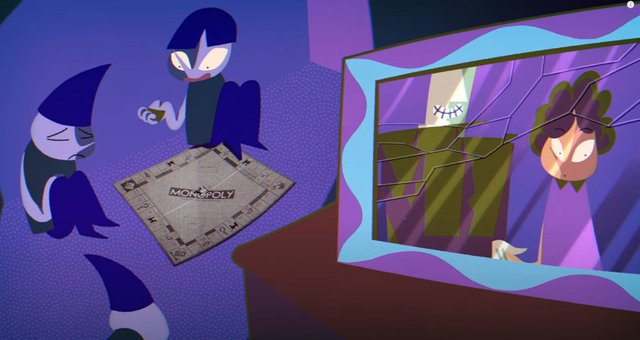We are defined by our stories. As individuals by the stories we tell each other about ourselves ans as nations by the popular national stories we spread among our own societies or, if our nation is rich and powerful, around the world.

source: YouTube
These stories are mostly spread through a top-down trajectory; as nations we're defined by the stories of our heroic leaders, be it the royal family in many European countries, or the "Founding Fathers" in the much younger American nation. Also the stories about the roles our countries play in pivotal moments in world history define our countries' public image to a great extent. While here in The Netherlands the stories about the Second World War are mostly about secret, nonviolent acts of resistance, the American stories are all about how their mighty military liberated Europe from the Nazis. The latter stories have become so popular all over the world that the whole world actually believes them, while the truth is that the Germans were defeated at the eastern front, by the Russians.
What's true about almost all of these defining narratives though, is that they all revolve around the super rich, be it the rich on a national level, or the rich countries on a global level. That's because the one narrative that supersedes them all is the Monopoly narrative, the ideology that normalizes the concentration of wealth in the hands of the few. One medium through which this narrative has been spread around the world is the game of Monopoly; in it players try to become the all-powerful rich person who bankrupts the other players. I've written about this before, but let me repeat here that the original set of rules for the game were intended to paint a contrast between monopolies and an economy in which everybody benefits from the rent.
The game was invented by Lizzie Magie, and she originally called it The Landlord's Game. In it there were not one, but two sets of rules, one with the aim as we know it now, the "monopoly rules", and the "prosperity rules" with the aim of everybody becoming rich. She designed the game explicitly to teach players the evils of the capitalist economy as we know it, the injustice of making more money with money or assets. Unfortunately Lizzie Magie sold the patent of her game for just 500 dollar to the Parker Brothers, now a brand of Hasbro, who got rid of the prosperity rules. In societies where the monopoly narrative is the rule, all prosperity narratives are suppressed with force; just remember how socialism, communism and anarchism are demonized in the most capitalist and powerful country in the world...
What The Monopoly Man Won’t Tell You
Thanks so much for visiting my blog and reading my posts dear reader, I appreciate that a lot :-) If you like my content, please consider leaving a comment, upvote or resteem. I'll be back here tomorrow and sincerely hope you'll join me. Until then, keep safe, keep healthy!

Recent articles you might be interested in:
| Latest article >>>>>>>>>>> | Homeless |
|---|---|
| Plutonomy Report | Awakening |
| White Collar Thugs | Going Solo |
| Geek History Revisited (repost) | Cheaper Slaves |

Thanks for stopping by and reading. If you really liked this content, if you disagree (or if you do agree), please leave a comment. Of course, upvotes, follows, resteems are all greatly appreciated, but nothing brings me and you more growth than sharing our ideas.
Interesting content. I am recently reading about elite theory, which indicates surprisingly similar patterns with whales and minnows' dynamics
Downvoting a post can decrease pending rewards and make it less visible. Common reasons:
Submit
Thanks so much for the response @staycurious :-) Never heard of "elite theory", so thanks for mentioning it; I'll be sure to look, it up ;-)
Downvoting a post can decrease pending rewards and make it less visible. Common reasons:
Submit